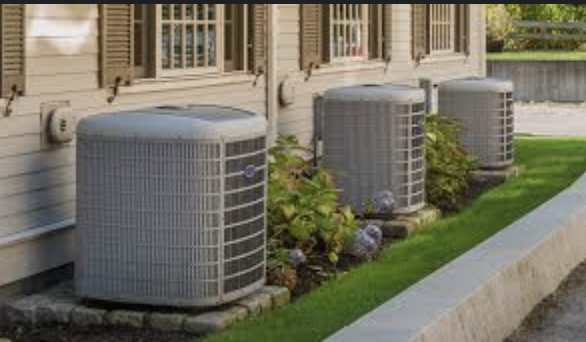HVAC 101: Understanding the Basics of Heating and Cooling Systems

Are you a homeowner looking to understand your heating and cooling system better? Don’t worry; we’re here to help! Heating, Ventilation, and Air Conditioning (HVAC) systems are vital in maintaining the comfort levels within our homes.
These complex systems can often seem daunting, especially when trying to navigate through all the technical jargon. In this blog post, we’ll break down the basics of HVAC systems in an easy-to-understand manner, teaching you valuable information that can save you time and money in the long run.
You can also visit the following contractor to learn more about how HVAC systems generally work and to potentially schedule a consultation about your home comfort setup: https://www.hurlimanheating.com/
HVAC System Overview
HVAC systems comprise components such as gas furnaces, heat pumps, air conditioning units, and ductwork that regulate indoor temperature, air quality, and humidity.
The system operates by circulating warm or cool air through the house via a series of ducts or split systems.
Components Of HVAC Systems
One of the key elements in understanding HVAC basics is becoming familiar with its essential components. At the heart of any heating, ventilation, and air conditioning system are three primary parts: a heating unit (such as a furnace or heat pump), an air conditioning unit (typically found outside the home), and ductwork responsible for distributing heated and cooled air throughout your living space.
To paint a clearer picture, let’s take a look at an example. Suppose you have a split system installed in your home – one of the most common types of HVAC systems. The furnace heats your house by burning fuel (like natural gas), while an outdoor AC unit cools down incoming warm air before it gets distributed through the ducts into each room via vents or registers.
How HVAC Systems Work
HVAC systems are designed to keep your home comfortable by controlling the temperature, humidity, and air quality. This is achieved through a network of components that work together seamlessly in harmony.
The heating system typically consists of a gas furnace or heat pump that generates warm air, which is distributed throughout your home via ductwork. In contrast, cooling systems use refrigeration principles where an outdoor unit compresses and cools refrigerant before circulating it inside through coils located within your house.
Ventilation systems help regulate air circulation while also removing stale indoor air and circulating fresh outdoor air indoors, ensuring you always have clean breathable air flowing through your home.
Types Of HVAC Systems
There are several types of HVAC systems to choose from that vary in size, efficiency, and cost. One common type is a split system with indoor and outdoor units.
This system is popular because it can be used for both heating and cooling and provides individual temperature control. Another type is a heat pump, which transfers heat between the indoors and outdoors using electricity instead of burning fuel like a gas furnace.
For those who prioritize air quality, there are HVAC systems with added features such as humidifiers or air purifiers built in to improve indoor air quality.
It’s important to consider your budget, home size and layout when deciding on the best HVAC system for your needs.
Maintenance And Troubleshooting Tips
Regular maintenance of HVAC systems is essential for peak performance and energy efficiency. Simple tasks such as changing air filters, cleaning ducts, and inspecting wiring can prevent potential problems down the line.
However, if issues do arise, homeowners should know how to troubleshoot common HVAC problems like low airflow or a malfunctioning thermostat.
Importance Of Regular Maintenance
Regular HVAC maintenance is crucial for homeowners in order to ensure optimal performance and longevity of their heating and cooling systems. Neglecting regular maintenance can lead to a variety of issues, such as decreased energy efficiency, higher utility bills, and even complete system failure.
During routine maintenance, the technician will perform tasks such as cleaning the coils and ducts, checking refrigerant levels, inspecting electrical connections, and replacing air filters.
These tasks improve your HVAC system’s efficiency and ensure it’s running safely. Furthermore, regular maintenance helps extend your system’s lifespan, ultimately saving you money on expensive repairs or replacement costs down the line.
Common HVAC Issues And Solutions
HVAC systems can be complex, and sometimes homeowners may encounter issues with their heating or cooling systems. One common issue is a faulty thermostat, which can cause the HVAC system not to function properly.
In some cases, simply changing the batteries in the thermostat can solve this problem. Another potential issue is dirty filters, which prevent proper air circulation and reduce indoor air quality.
Additionally, leaks in the ductwork can cause inefficient heating or cooling, leading to higher energy bills and poor indoor comfort levels. This issue should be addressed by a professional HVAC technician who can perform duct sealing or replacement as needed.
When To Call A Professional
While regular maintenance is crucial for your HVAC system’s longevity, sometimes issues arise that require professional intervention. It’s important to know when it’s time to call in a licensed and experienced HVAC technician.
Other warning signs include abnormal energy bills, insufficient airflow throughout your home, and inconsistent room temperatures. Additionally, if you notice unusual condensation around the unit or ductwork, it could be due to leaks that only an expert can fix.
Conclusion
In conclusion, understanding the basics of HVAC systems is crucial for homeowners. By knowing how these systems work and what components they consist of, you can better maintain them and troubleshoot any issues that may arise.
Regular maintenance is also important to ensure energy efficiency and indoor air quality. Don’t hesitate to call a professional if you have any concerns or questions about your heating and cooling system.




























